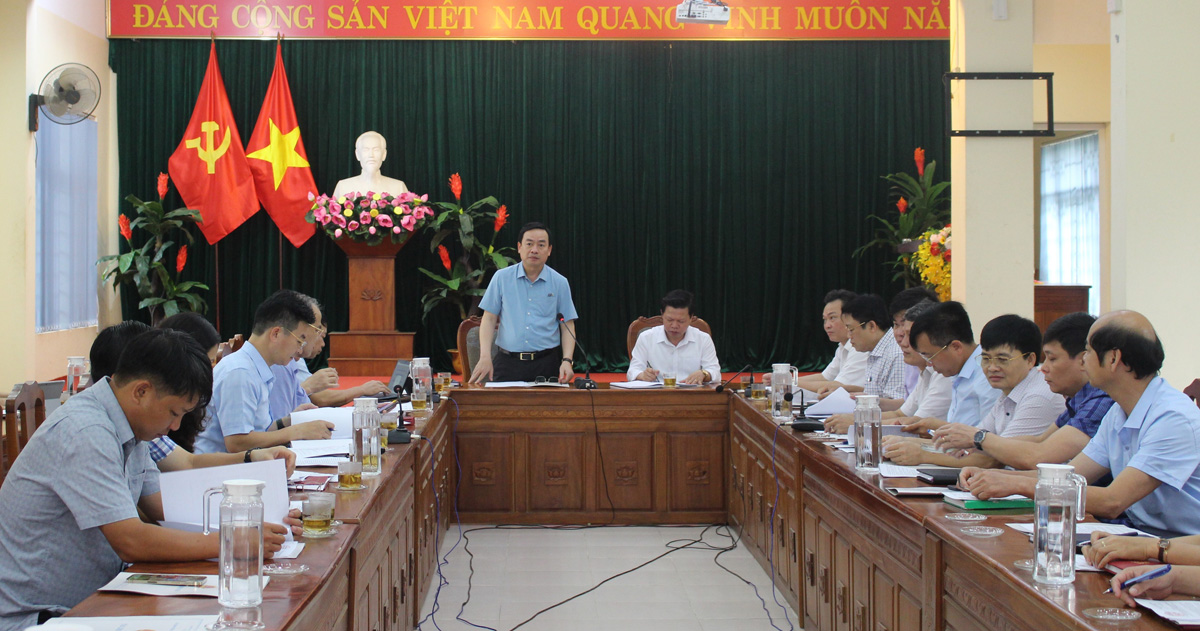
(HBO) - The provincial People’s Committee on April 23 held a working session with the People’s Committee of Yen Thuy district on measures to ensure budget collection and develop industry-handicraft and a number of other issues. Vice Chairman of the provincial People’s Committee Quach Tat Liem chaired the event.
 Quach Tat Liem, Vice Chairman of the provincial
People’s Committee concludes the working session.
Quach Tat Liem, Vice Chairman of the provincial
People’s Committee concludes the working session.
According to a report
by the Yen Thuy People’s Committee, over the years, industry and handicraft
production of Yen Thuy has seen progress, but growth in production value is
still low at about 6 percent per year in the 2016-2020 period.
In the first quarter
of 2021, the value of the district’s industry sector reached 317 billion VND,
up 7.1 percent year on year. So far, Yen Thuy has 15 companies, three
cooperatives and 560 facilities operating in industry-handicraft sector.
As of April 19, total State
budget collection in the district was 31.61 billion VND, fulfilling 24 percent
of the target. Collection from taxes, fees and other sources was 16.25 billion
VND, while that from land use fee was over 15 billion VND.
The People’s Committee
of Yen Thuy proposed that the provincial People’s Committee of Hoa Binh and
departments and sectors support the district in attracting investment in Lac
Thinh industrial park, while excluding unfeasible projects such as the Hang
Tram industrial cluster out of the industrial park planning.
The district asked for
permission to expand the acreage of Lac Thinh IP from 220 hectares to about 830
hectares in 2030, along with adding the 550-hectare Bao Hieu IP to the IP
planning.
It also asked for early
allocation of funding for the district to implement a project to upgrade the
power supply system in remote and extremely difficult areas in the province.
Concluding the session,
Liem lauded the achievements that Yen Thuy has gained in implementing
socio-economic development goals, with a number of targets exceeding the set
goals. However, he pointed out that the district has yet to optimise its
potential and advantages in geographical location and transport.
He asked the district
to direct relevant agencies to coordinate with departments and sectors to
improve planning work, with special attention paid to major transport projects,
thus creating motivation for development.
Dao Village’s honey – a product certified with a 3-star OCOP (One Commune One Product) rating by Thong Nhat Agricultural Cooperative in Dao Village (Hoa Binh City) – is highly regarded by consumers for its quality, richness, and variety in packaging. The distinctively sweet taste of Dao Village’s honey leaves a lasting impression on anyone who has tried it.
In alignment with Project No. 07-DA/TU, issued by the Hoa Binh provincial Party Committee on November 1, 2021, Lac Thuy district has actively promoted investment and supported the sustainable development of its industrial and handicraft sectors during the 2021–2025 period. Alongside this, the district has remained committed to preserving and revitalising traditional craft villages.
Located in the northern part of Lac Thuy district, with a temperate climate and fertile soil, Phu Thanh commune has great potential and advantages in growing tea. The long-standing experience, combined with strict adherence to organic farming practices in the tea gardens, ensures that the dried tea products from Phu Thanh and Lac Thuy as a whole are sold out immediately upon production, providing a stable and prosperous life for the local people.
Amid efforts to streamline the administrative apparatus, Hoa Binh province has intensified measures to address challenges in land clearance, resettlement support, and infrastructure investment, aiming to speed up the progress of key projects.
Hoa Binh province has posted an unprecedented economic growth rate of 12.76% in the first quarter of 2025, marking its highest quarterly performance to date and positioning it as the second fastest-growing locality in the country, trailing only Bac Giang province.
Under current regulations, products in the One Commune – One Product (OCOP) programme that are rated three stars or higher must undergo re-evaluation every three months. However, in reality, some of these products fail to consistently meet the required standards, raising concerns about the sustainability of their OCOP certification. This underscores the urgent need for producers to enhance product quality and gradually develop their OCOP products into strong, marketable brands.



 Quach Tat Liem, Vice Chairman of the provincial
People’s Committee concludes the working session.
Quach Tat Liem, Vice Chairman of the provincial
People’s Committee concludes the working session.